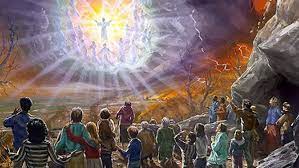Ad – Glossary
Glossary

Abba: An Aramaic word used as an affectionate term of address to someone’s father. Yeshua used it to refer to God as His Father, and believers in Jesus also use it today to address God as Father. In modern Hebrew, this common name means Dad, Daddy, or Papa (also see Mark 14:36 and Romans 8:15).
Adar: the twelfth month of the Jewish biblical calendar.
Adonai: literally, my Lord, a word the TaNaKh uses to refer to God.
ADONAI: The Tetragrammaton, meaning the four-letter name of YHVH. Since its pronunciation is not known, and also out of respect for God’s name, Jews traditionally substitute the words ADONAI and Ha’Shem. ADONAI, however, is more of an affectionate name like daddy (also see Exodus 3:15; Jeremiah 1:9; Psalm 1:2; Matthew 1:22; Mark 5:19; Luke 1:5; John 1:23).
ADONAI Elohei-Tzva’ot: the LORD God of heaven’s angelic armies.
ADONAI Elohim: This is the Hebrew word for LORD God. This title links Isra’el’s God, the God of the Covenant, with God as Creator of the universe (also see Genesis 2:4; Isaiah 48:16; Psalm 72:18; Luke 1:32; Revelation 1:8).
ADONAI Nissi: the LORD my Banner (see Exodus 17:15; Psalm 20:1).
ADONAI Shalom: the LORD of Peace.
ADONAI Tzidkenu: the LORD our Righteousness.
ADONAI-Tzva’ot: The LORD of heaven’s angelic armies (see Joshua 5:13-15; Second Kings 19:31; Psalm 24:10; Second Corinthians 6:18).
Adversary, the: Satan, the devil, the prince of the power of the air, and the old dragon.
Afikomen: Literally, “That which comes after.” Piece of matzah that is hidden during the Seder, to be found and eaten after the third cup of redemption.
Amen: At the end of a prayer, this word means, “It is true,” or “Let it be so,” or “May it become true,” indicating that the readers or listeners agree with what has just been said. Although everything Yeshua said was true, “amen” adds special emphasis (also see Deuteronomy 27:25; Jeremiah 28:6; Psalm 41:14; Nehemiah 8:6; Matthew 5:26; Mark 10:15; Luke 23:43; John 10:1).
Anti-missionaries: Today they are Orthodox Jews who champion Jews for Judaism. They do not limit their mischief to harassing missionaries; any Jewish believer is a target. It is unfortunate that so many of these anti-missionaries feel their ends justify certain unethical means. In order to “protect” Judaism, they do or encourage others to do what Judaism condemns. In Paul’s day, they were the Judaizers who wanted Gentile believers to add obedience to the 613 commandments of Moshe, circumcision, and eating kosher to Paul’s salvation equals faith-plus-nothing gospel.
Ariel: lion of God, fireplace on God’s altar.
Aviv: the first month of the biblical year, corresponding to the modern Jewish month of Nisan.
Avraham: Abraham
Azazel: a scapegoat or goat demon sent out in the wilderness on Yom Kippur.
Ba’al: the chief male god of the Phoenicians and Canaanites. The word means lord or master.
Bar Mitzvah: Hebrew for “Son of the Commandment.” Although not specifically mentioned in the Bible, it is a Jewish coming of age ritual in which a young man, or Bat Mitzvah for a young woman, chooses to follow the commandments of their forefathers and takes responsibility for their own relationship with the God of Isra’el. This ceremony normally takes place at age 13 for boys or age 12 for girls. Afterwards, he/she is theoretically considered to be an adult, but in modern Judaism this is mostly symbolic, and a twelve-year-old is not treated like an adult.
Beit-Lechem: Bethlehem, the birthplace of David and Yeshua, meaning house of bread.
Bnei-Yisrael: The children of Israel.
B’rit Chadashah: Hebrew for the New Covenant. Gentiles commonly call it the New Testament.
Chesed: “mercy,” “lovingkindness,” and/or “covenant-loyalty.” It is a complex word that summarizes God’s complex and overwhelming love for His people, going beyond the concepts of love, mercy or kindness all together (also see Isaiah 63:7; Zechariah 7:1; Psalm 13:1; Psalm 86:1; Psalm 107:1; Psalm 118:1; Psalm 136:1).
Chuppah: In traditional Jewish weddings, it is a canopy under which the wedding takes place.
Cohen of Ha’Elyon: Priest of the God Most High.
Cohen Rosh Gadol: The Great High Priest who served as the head religious official, the only one to enter the Most Holy Place. Aaron, the brother of Moses, was the first man appointed as the Cohen Gadol. In later times, the Cohen Gadol was in charge of the Temple and its administration. The Cohen Gadol Caiaphas, played a key role in questioning Yeshua at His trial. The writer of Hebrews describes Messiah as our great Cohen Gadol, who gives us access to God’s throne in the heavenly sanctuary (also see Leviticus 21:10; Haggai 1:14; Nehemiah 3:1; Matthew 26:57ff; Mark 14:61ff; John 18:19ff; Hebrews 4:14ff and 10:19-22).
Cohen: A priest, a man who offered sacrifices and performed other religious rituals at the Temple in Jerusalem.
Cohanim: The Cohanim were descended from Aaron, the brother of Moses. The Sadducees were from the priestly sect of Judaism.
Covenant: Theologically, it speaks of the contractual relationship between God and His people. The Hebrew term is b’rit. Also see B’rit Chadashah, Hebrew for New Covenant (see Genesis 6:18 and 17:2; Jeremiah 31:30; Nehemiah 9:32; Matthew 26:28; Mark 14:24; Luke 1:72).
Diaspora, the Dispersion: the scattering of the Jewish people in exile throughout the world. Today almost 7 million Jews live in Isra’el, and over 8 million more Jews live in the Diaspora (also see Isaiah 11:10; John 7:35).
Drash: A drash is a long d’var.
D’var: Is a short talk on topics relating to a parashah, the weekly Torah portion.
Echad: The Hebrew word for “one” or “unity.” Echad is used in the Shema (Deuteronomy 6:4).
Elyon: A title for God, meaning the Most High God (see Luke 1:35 and 76; Acts 7:48). A longer form is El Elyon, God Most High (also see Deuteronomy 32:8; Isaiah 14:14; Psalm 91:1; Acts 16:17).
Elohim: “God” in general terms, or as Creator. Compared with ADONAI, God’s “covenant name” is used especially in His relationship to the Jewish people. Elohim is the plural form of El, also found in the Bible occasionally with the same meaning. Yeshua is sometimes called Ben-Elohim, the Son of God (also see Genesis 2:19; Isaiah 61:11; Matthew 4:3; Mark 1:1; Luke 1:35; John 11:4).
El Shaddai: God Almighty
Emissaries: Apostles
God-fearers: These were Gentiles who became convinced that ADONAI was the only true God, they abandoned their paganism and idolatry, but they did not choose to become a proselyte in any form, and hence there was no adoption of Jewish customs or practices (see the commentary on Acts, to see link click Bb – An Ethiopian Asks about Isaiah).
Goyim: Nations, non-Jews, Gentiles
Gehenna: The word for “hell,” the place of perpetual misery and suffering after this life. It comes from the Greek word Genna and the Hebrew word Gei-Hinnom, which means the valley of Hinnom. There was actually such a valley by that name south of the Temple in Jerusalem. It was used as a garbage dump, and fires were always burning there, making it a suitable picture of life in hell. In Jewish sources, the term is used as the opposite of Gan-Eden, or the Garden of Eden or Paradise (Matthew 23:33; Mark 9:43).
Gentiles: A term for individuals or groups who are not Jewish. In Hebrew a common word for Gentile is goy or goyim is the plural form (see Isaiah 8:23; Matthew 10:18; Mark 10:33).
Go’el: Literally, a redeemer, used both for God and of people. In the book of Ruth, go’el means the kinsman-redeemer, a close relative obligated to defend and protect his kin. The go’el could buy back (redeem) land or someone who sold himself into slavery, and could marry a widow in the family in order to protect her future. The human go’el is a picture of God the greater Go’el who protects and redeems us, the members of His family (see Ruth 3:9-12).
Grace: Receiving what we don’t deserve.
Hag ha’Matzah: The Feast of Unleavened Bread
Halakhah: are rules governing Jewish life and comes from the Hebrew root to walk. The rabbis used the term to refer to the legal way to walk out the commandments of the Torah. It can also refer to the Oral Law (see the commentary on The Life of Christ Ei – The Oral Law). A (one) halakhah is a specific ruling given regarding a particular issue, “the halakhah” being the ruling accepted and observed by the Jewish community.
Hametz or Chametz: The Hebrew word for leaven, or yeast, which makes bread rise. God commanded Isra’el not to eat hametz during Passover, Yeshua teaches that both good and evil spread, the same way hametz leavens the whole batch of dough (Also see 16:6-12; Mark 8:15; Luke 12:1 Exodus 12:20; Leviticus 7:13; Amos 4:5; Matthew 13:33 and 13:21).
Hanukkah: Meaning dedication, the feast commemorating the victory of the Maccabees over the armies of Antiochus Epiphanes in 165 BC and the rebuilding and dedication of the Temple after its desecration by Syrian invaders.
Ha’Shem: The Tetragrammaton, meaning the four-letter name of YHVH. Since its pronunciation is not known, and also out of respect for God’s name, Jews traditionally substitute the words ADONAI and Ha’Shem. While ADONAI is more of an affectionate name like daddy, Ha’Shem is a more formal name like sir (also see Exodus 3:15; Jeremiah 1:9; Psalm 1:2, Matthew 1:22; Mark 5:19; Luke 1:5; John 1:23).
Hellenist: In the B’rit Chadashah, it refers to Jews who lived in the Diaspora, or had moved to Isra’el from the Diaspora, spoke Greek, and were more Greek in their culture, than traditional Jewish people brought up in Isra’el (Acts 6:1, 9:29, 11:20).
Immerse: To dip the whole body under water as an act of dedication to the LORD, or as a profession of faith in Yeshua. The word is often seen in other translations as “baptize.” The ceremony of dipping is called “immersion” or “baptism.” Yeshua’s cousin was known as John the Immerser (Matthew 3:1; Mark 6:14; Luke 7:20).
Imputation: To reckon or charge to one’s account. When the Spirit gives life (John 6:63a), that means that all the righteousness of Christ is transferred to your spiritual account at the moment of faith. What is true of Messiah is true of you, minus His deity.
Incarnation: The divine revelation (Hebrews 1:1-2) of YHVH becoming one with humanity as an ordinary human being in the person of Yeshua Messiah. He was one-hundred percent man and one-hundred present God. The Triune God knew that the Second Person would come to earth to be subject to numerous evils: hunger, ridicule, rejection, and death. He did this in order to negate sin, and therefore, its evil effects.
Judaizers: Jewish false teachers, who taught that obedience to the 613 commandments of the Torah were necessary to have a relationship with God, and opposed Paul at every turn. Everywhere Paul went, the Judaizers were sure to follow. Once Paul established a church in Galatia, as soon as he left, they would come in and distort the gospel of Messiah (see the commentary on Galatians Ag – Who Were the Judaizers).
Justification: The act of God whereby, negatively, He forgives the sins of believers and, positively, He declares them righteous by imputing the obedience and righteousness of Messiah to them through faith (Luke 18:9-14). It is not a reward for anything good we have done. It is not something we cooperate with God in (in other words, it is not sanctification). It is an utterly undeserved free gift of the mercy of ADONAI (Romans 3:24; Titus 3:7). It is entirely accomplished by God, once and for all, at the moment of salvation. It results in good deeds (James 2:14-26) and sanctification over our lifetime.
Kadosh: The Hebrew word for ‘holy.” This term describes the people set apart for God. ADONAI Himself is kodosh (Leviticus 19:1-2). Many letters to Christ’s newly formed communities (churches) address Yeshua’s followers as the Kedoshim (also see Jeremiah 2:3; Nehemiah 8:10; First Corinthians 1:2; Ephesians 1:1; Philippians 1:1; Colossians 1:2).
Kedoshim: The holy ones
Ketubah: In traditional Jewish weddings it is the legally binding marriage contract or covenant.
Korban: A sacrifice or offering dedicated to God, especially to fulfill a vow. If something was to be dedicated to God, it generally could not be used for other purposes. Some Pharisees and teachers of the law wrongly used this as an excuse not to provide for their parents in their old age, even though Jewish teaching insisted that the commandment to honor one’s father and mother extended to providing for their physical needs (see Mark 7:11).
Kosher: Kosher foods are those that conform to the Jewish dietary regulations of kashrut, primarily derived from Leviticus and Deuteronomy. Food that may be consumed according to halakha is termed kosher in English, from the Ashkenazi pronunciation of the Hebrew term kashér, meaning “fit”.
Levite: Descendants of the tribe of Levi, who served in the Tabernacle and Temple as gatekeepers, musicians, teachers, and assistants to the priests. The scribes, or Torah-teachers, originally came only from among the Levites and were the forerunners of the Pharisees. The Pharisees later expanded to include members who were from all tribes, with no affiliation with Levi required. (Also see Exodus 4:14; Ezeki’el 48:12; Ezra 1:5; John 1:19).
LORD: When the translators of the King James Bible in the 1600’s came to the Hebrew word YHVH, they needed to distinguish it from the word Lord, meaning master. So, they capitalized it. Therefore, LORD is actually the Tetragrammaton, meaning the four-letter name of YHVH.
LXX (Septuagint): The “official” Greek translation of the TaNaKh, dating from the third century BC through the fourth century AD. The original translation was of the Torah (the five books of Moshe), which the Letter of Aristeas records was allegedly made by seventy Jewish scholars in Alexandria (Egypt) from which it gained its name (Septuaginta). It is commonly referred to by the abbreviation, LXX (70).
Malki-Tzedek: Melchizedek.
Mashiach (Hebrew): Messiah, the Anointed One (Matthew 26:63; Mark 1:1; John 20:31).
Matzah (singular) or Matzot (plural): Unleavened bread, which is made without yeast, eaten especially during the feast of Passover. Also see hametz (also see Exodus 13:6; Leviticus 2:5; Ezeki’el 45:21; Matthew 26:17; Mark 14:22; Luke 22:19; John 13:26).
Masoretic Text: The official text of the TaNaKh edited by the Massoretes, or Jewish grammarians, during the sixth to tenth centuries AD. This text is “pointed” with various vowel signs and accents which were lacking in the previous texts.
M’chitzah, the: The middle wall of separation (see the commentary on Acts Cn – Paul’s Advice from Jacob and the Elders at Jerusalem).
Megillah (singular) or Megillot (plural): The five books in the Writings used for special readings during the holidays: Song of Songs, Ruth, Lamentations, Ecclesiastes and Esther.
Menorah (singular) or Menorot (plural): The seven branched lampstand(s) designed and commanded by God for service in the Tabernacle/Temple (Exodus 25:32; First Kings 7:49; Zechariah 4:2).
Mercy: Not getting what we deserve.
Messiah (Greek): Christ, the Anointed One, often used in speaking of a Redeemer sent from God to free His people from exile and oppression (also see Matthew 1:16; Mark 8:29; Luke 2:11 and John 1:41).
Midrash (singular) or Midrashim (plural): allegorical interpretation or application of a text. The listener is expected to understand that the writer of the midrash is not expounding the plain meaning of the text, but introducing his own ideas.
Mikveh: a bath or pool with a flow of fresh water; used in Orthodox Judaism to this day for ritual purification or ceremonial cleansing, performed at various times in a person’s life (see Matthew 3:13 and Titus 3:5).
Mitzvah (singular) or mitzvot (plural): A commandment from God. Another, more modern, meaning is “a good deed,” more broadly, a general principle for living (Deuteronomy 11:22; Second Kings 17:37; Proverbs 6:20; Matthew 26:10; Mark 14:6).
Moshe: Moses.
Olam haba: “The age to come,” or “the world to come.” It describes a time after the world is perfected under the rulership of Messiah. This term also refers to the afterlife, where the soul passes after death. It can be contrasted with olam ha-zeh, “this world” (Matthew 12:32; Mark 10:30; Luke 18:30 and 20:35; Ephesians 1:21; Hebrews 6:5; Revelation 20-21).
Omer: Meaning “sheaf,” the bundle of barley used in the Firstfruits offering. After the Temple period it came to be identified with Sefirat ha’Omer, or the counting of the omer, the counting of the days from Firstfruits to Shavu’ot.
Pesach: Passover. The Jewish festival commemorating deliverance from Egyptian bondage. In Biblical times Jews used to journey to the Temple, sacrifice lambs there, and eat a special meal commemorating the departure of the Jews from slavery in Egypt. It was one of the three “pilgrimage festivals” that all able-bodied Jews were expected to celebrate before YHVH in Yerushalayim. Today, Passover is celebrated at home with a special meal called a seder. Yeshua celebrated Passover with His apostles (Matthew 26:18; Mark 14:12; Luke 22:7; John 13:1).
Pharisees: One of the sects of Judaism in the first century. The Pharisees had their own views of how exactly to keep Torah. They were especially concerned with ritual impurity and (unlike the Sadducees) they believed in the resurrection of the dead. While the Sadducees were more involved with the Temple, the Pharisees were concerned more with home and synagogue life.
Propitiation: The averting of God’s wrath by means of the substitutionary and efficacious (producing the desired effect) sacrifice (death) of Yeshua Messiah (the atonement). It is the work of Messiah that satisfies every claim of God’s holiness and justice so that Ha’Shem is free to act on behalf of sinners.
Proselytes at the Gate: There were three levels of Gentile relationship to Judaism. After God-fearers and proselytes of the Gate were the second level. The Gate was the middle wall of separation (Ephesians 2:14) in the Temple compound that Gentiles were not allowed to go beyond under penalty of death (see the commentary on Acts Bb – An Ethiopian Asks about Isaiah 53). These were Gentiles who adopted many Jewish practices like celebrating Shabbat and the feast of Isra’el, but did not become a full proselyte. Most of these were men because it didn’t require circumcision.
Proselytes of the Covenant: In the third level of Gentile relationship to Judaism (see above), there were proselytes of the Covenant. They entered into the Covenant of Sinai as a full Jew, so to speak. Most of these were women because this level required circumcision.
Purim: Meaning “lots,” is the holiday based on the story of Esther.
Qumran: The documents which were discovered at Khirbet Qumran on the Dead Sea and frequently known as the Dead Sea Scrolls. These texts include partial copies and fragments of most of the biblical books (the only whole copy is Isaiah), apocryphal writings such as Enoch, and texts produced by the community itself (the manual of Discipline and the Thanksgiving Hymns). The texts are referred to according to the number of the cave in which they were discovered (for example, 1Qs [Community Rule], 11Q Temp [Temple Scroll]).
Rasheet: One of several names for the Festival of First Fruits.
Redeemed: Setting free from slavery, buying back something lost, for a price.
Righteous of the TaNaKh: Old Testament believers.
Rosh Ha’Shanah: Hebrew for “Head of the Year.” Known as the Jewish New Year, or the Feast of Trumpets.
Ruach: The Hebrew word for “spirit,” “breath,” or “wind.” Yeshua explains wind and Spirit to Nicodemus in John 3:5-8. Scripture frequently refers to the Ruach ha-Kodesh, the Holy Spirit (Exodus 35:31; Numbers 11:25; Malachi 2:15; Acts 2:2 and 10:44; Romans 8:4-17).
Ruach Ha’Kodesh: The Hebrew name for the Spirit of God, or the Holy Spirit (Isaiah 63:11; Psalm 51:13; Matthew 1:20; Mark 1:8; Luke 1:16; John 14:26).
Sadducees: One of the sects of Judaism in the first century. From the Sadducees came the leading priests who managed the affairs of the Temple. In contrast to the Pharisees, they did not believe in the resurrection of the dead (Matthew 16:12; Mark 12:18; Luke 20:27).
Sanhedrin: Literally, the gathering of the seated, like being a judge seated on a bench – a legal term for an officiating judge. This was the Supreme Court of ancient Isra’el. It exercised legislative and judicial authority (Matthew 26:59; Mark 15:1; Luke 22:66; John 11:47).
Sanctification: To be set apart, specifically, to the holy use and purposes of God. It is a process that takes a whole lifetime. It is the work of God in which you cooperate (Romans 12:1-2; First Corinthians 10:13; Hebrews 12:3-4; First Peter 5:8-9); and is a process Ephesians 4:11-16), trusting in God, apart from whom we can do nothing (John 15:5; Ephesians 3:16; Colossians 1:11; Hebrews 2:18 and 4:14). He who began a good work in you will carry it on to completion until the day of Christ Jesus (Phil 1:6).
Septuagint: The Septuagint is the Greek translation of the Hebrew Scriptures and was presumable made for the Jewish community in Egypt when Greek was the common language throughout the region. It is also called the translation of the Seventy because tradition states that the Septuagint was translated by seventy rabbis. In academia, the Septuagint is often abbreviated as LXX (the Roman numeral for seventy) in honor os this translation.
Shabbat: The Sabbath Day, the seventh day of the week, when work ceases. On this day God’s people are beckoned to rest and renew our relationship with our Creator, who also rested on the seventh day. Shabbat begins on Friday evening at sundown and ends Saturday evening after three stars appear (Exodus 20:10; Nehemiah 9:14; Matthew 12:10; Mark 1:21; Luke 23:56; John 9:14).
Shaddai: A common name for God in the TaNaKh, usually translated as Almighty. The name is often used in a combination such as El Shaddai, or God Almighty (Genesis 17:1; Ezeki’el 1:24; Job 11:7).
Shalom: Shalom speaks of the practical result of God’s grace in our lives. Peace is the usual Hebrew greeting. But the Hebrew shalom means more than “peace” does in English. It doesn’t necessarily mean the absence of strife, but the presence of positive blessings. It implies the prosperity of the whole person, especially his spiritual prosperity. Shalom transcends our circumstances and is anchored in our intimate relationship with ADONAI. That is God’s shalom, which passes all understanding (Philippians 4:7a). It is also a greeting used when meeting or departing (Genesis 26:31; First Samuel 16:4; Second Chronicles 18:16; Matthew 10:13; Mark 9:50; Luke 1:28; John 14:27).
Sh’khinah: The visual manifestation of the glory of God.
Shavu’ot: the festival of Weeks (Hebrew) or Pentecost (Greek), since it comes seven weeks after Pesach; also called Pentecost, from the Greek word for fifty because one counts fifty days after Passover. It is one of the three “pilgrimage festivals” that all able-bodied Jews were expected to celebrate before YHVH in Yerushalayim. It originally celebrated the harvest, but later commemorated the day God gave the Torah to Isra’el. After Yeshua’s resurrection, the disciples waited for God’s gift of the Ruach Ha’Kodesh, which also came on Shavu’ot (Exodus 34:22; Second Chronicles 8:13; Acts 2:1 and 20:16; First Corinthians 16:8).
Sh’ol: The Hebrew equivalent of the Greek “Hades,” the place where the dead exist. It had two compartments, a place of torment and paradise, separated by a great divide (see the commentary on The Life of Christ Hx – The Rich Man and Lazarus). Paradise was emptied after Messiah preached to the tormented lost sometime during the three days that His body lay in the tomb, and then He led the righteous of the TaNaKh to heaven.
Shofar: A ram’s horn, used in the Bible for summoning armies, calling to repentance, and in other situations. Blasts of various lengths and numbers signified different instructions. Metal trumpets were also used for similar purposes, but exclusively by the cohanim. Today, the shofar is used on Rosh ha-Shanah of Yom Kippur, the Jewish High Holy Days. The shofar also ushers in the Year of Jubilee (Leviticus 25:9-10; Zechariah 9:14; Matthew 24:31; First Corinthians 15:52; First Thessalonians 4:16-17).
Sinai: the mountain in the desert between Egypt and the land of Isra’el.
Shuwb: turn, turning, and the big idea of Jeremiah.
Son of Man: A name that Yeshua commonly used to refer to Himself. It comes from Dani’el 7:13-14, in which the Son of Man is given all authority. This name sometimes emphasizes Yeshua’s humanity and sometimes His deity (Matthew 9:6; Mark 9:31; Luke 21:36; John 6:27).
Sukkot: the festival of Booths or Tabernacles, celebrating the forty years when the people of Isra’el lived in booths, tents, shacks, in the desert between Egypt and the land of Isra’el. The Hebrew word sukkah means booth and sukkot is the plural and means booths. Sukkot is one of the three “pilgrimage festivals” that all able-bodied Jews were expected to celebrate before YHVH in Yerushalayim (Leviticus 23:34; Zechariah 14:16; Second Chronicles 8:13; Matthew 17:4; Mark 9:5; Luke 9:33).
Synagogue: A place of assembly for Jews for hearing the Torah, praying and worshiping God. There were many synagogues throughout Isra’el and the Greco-Roman world (Matthew 4:23; Mark 5:22; Luke 4:16; John 9:22).
Tabernacle, the: A temporary dwelling, such as the booths constructed during Sukkot. It is also used in the TaNaKh of the tent in which God dwelt among the Jewish people, both in the wilderness and in the land of Isra’el. When the word is used as a verb, it refers to Yeshua coming to dwell among His people (John 1:14), reminding us of the wilderness Tabernacle and also of the Feast of Tabernacles (Exodus 25:9; First Chronicles 6:17; John 1:14 and 7:2).
Talmid (singular) or Talmudin (plural): Student or students.
Talmud: The codified body of Jewish Oral Law (see the commentary on The Life of Christ Ei – The Oral Law); includes literary creations, legends, scriptural interpretations, comprised of the Mishnah and the Gemara.
TaNaKh: The Hebrew word TaNaKh is an acronym, based on the letters T for “Torah”, N for “Nevi’im” (Prophets), and K for “Ketuv’im” (Sacred Writings). It is a collection of the teachings of God to human beings in document form. This term is used instead of the phrase, “the Old Testament,” which sounds “old” and outdated.
Torah: Literally, this Hebrew word means teaching or instruction (Exodus 13:9; Isaiah 2:3; Psalm 1:2; Matthew 5:17; Mark 1:22; Luke 24:44; John 7:19; Romans 7:1ff; First Corinthians 9:20-21; Galatians 3:21). It can be used for the five books of Moshe, or more generally to God’s commandments, or the whole TaNaKh (John 10:34). Uncapitalized, torah can be understood generally as a law or principle (Romans 7:21-8:2).
Torah-Teacher: A Torah scribe engaged in interpreting and transmitting the Torah. They wrote Torah scrolls, bills of divorce, and other legal documents. The Hebrew term is sofer.
Tree of Life: The tree at the center of the garden of Eden (Genesis 2:9, 3:24), the source of eternal life. Scripture points to a future in the B’rit Chadashah, with access to the Tree of Life. In the meantime, the Torah is like the Tree of Life to those who embrace her, and blessed will be all who hold firmly to her (Proverbs 3:18 also see Revelation 2:7, 22:2 and 14).
Tzitzit: A fringe that was put on a garment in accordance with Numbers 15:37-41.
Tziyon: Zion, Mount Zion, was originally the City of David, south of the modern Old City of Yerushalayim. Later the name Tziyon came to refer metaphorically to the Temple Mount, Jerusalem, or the people of Isra’el. The hill now called Mount Tziyon was given its name in the fourth century AD (Isaiah 1:27; Psalm 65:2; Matthew 21:5; John 12:15).
Yeshua: The Hebrew name for our Messiah, known in English as Jesus, and is a masculine form, and a word play on yeshu’ah (salvation) (Matthew 1:21; Mark 6:14; Luke 2:21; John 19:19).
Yerushalayim: Jerusalem.
Y’hudah: Judah.
YHVH: The Tetragrammaton, meaning the Name, the four-letter name of God. Therefore, God does not have many names, He has only one name – YHVH (Yud Hay Vav Hay). All the other names in the Bible describe His characteristics and His attributes.
Yisra’el: Isra’el.
Yochanan: John.
Yom ha’Bikkurim: One of several names for The Feast of Firstfruits.
Yom Kippur: The Day of Atonement, the close of the High Holy Days, and considered the holiest day of the year in traditional Judaism.



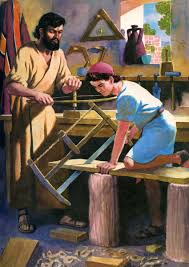 बारह साल के लड़के के रूप में जेरूसलम की यात्रा, चार सुसमाचार में पाए गए उनके लड़कपन का एकमात्र खाता है। इसका उद्देश्य उनकी असाधारण आध्यात्मिक विकास को प्रदर्शित करके येशु के सेवा में परिवर्तन करना है। खाते से उनके
बारह साल के लड़के के रूप में जेरूसलम की यात्रा, चार सुसमाचार में पाए गए उनके लड़कपन का एकमात्र खाता है। इसका उद्देश्य उनकी असाधारण आध्यात्मिक विकास को प्रदर्शित करके येशु के सेवा में परिवर्तन करना है। खाते से उनके  जैसे ही मरियम अपने मार्ग पर थी, और इलीशिबा शायद दरवाजे पर खड़ी थी। ऐसा लगता था कि उसे मरियम के अपने घर आने की उम्मीद की थी। इलीशिबा बूढ़ी महिला ने मरियम की आवाज़ पर तत्काल प्रतिक्रिया की और उन सभी चीजों की तत्काल पुष्टि की जो दूत ने उसे बताया था। जब इलीशिबा ने मरियम के अभिवादन को सुना, अचानक बच्चा उसके गर्भ में उछला, और इलीशिबा पवित्र आत्मा से भर गई (लूका १:४१)। गर्भपात के खिलाफ यह एक और अच्छ पद है। जो मां के गर्भ में है उसे पवित्रशास्त्र में एक व्यक्ति माना जाता है। जबकि यूहन्ना सर्वोच्च का एक भविष्यद्वक्ता होगा (ल्यूक १:७६), यीशु सर्वोच्च का पुत्र है (लूका १:३२)। जबकि यूहन्ना का जन्म एक बाँझ महिला के द्वारा जन्म वास्तव में चमत्कारी था, यीशु का कुंवारी के द्वारा एक बे-मिसाल जन्म था, और है।
जैसे ही मरियम अपने मार्ग पर थी, और इलीशिबा शायद दरवाजे पर खड़ी थी। ऐसा लगता था कि उसे मरियम के अपने घर आने की उम्मीद की थी। इलीशिबा बूढ़ी महिला ने मरियम की आवाज़ पर तत्काल प्रतिक्रिया की और उन सभी चीजों की तत्काल पुष्टि की जो दूत ने उसे बताया था। जब इलीशिबा ने मरियम के अभिवादन को सुना, अचानक बच्चा उसके गर्भ में उछला, और इलीशिबा पवित्र आत्मा से भर गई (लूका १:४१)। गर्भपात के खिलाफ यह एक और अच्छ पद है। जो मां के गर्भ में है उसे पवित्रशास्त्र में एक व्यक्ति माना जाता है। जबकि यूहन्ना सर्वोच्च का एक भविष्यद्वक्ता होगा (ल्यूक १:७६), यीशु सर्वोच्च का पुत्र है (लूका १:३२)। जबकि यूहन्ना का जन्म एक बाँझ महिला के द्वारा जन्म वास्तव में चमत्कारी था, यीशु का कुंवारी के द्वारा एक बे-मिसाल जन्म था, और है। यहाँ एक सवाल उठता है कि, “दो वंशावलियों की आवश्यकता क्यों पड़ी? खासकर जब कि यीशु यूसुफ के “असली” पुत्र नहीं थे?” जवाब आमतौर पर ऐसा कुछ जाता है, “मत्ती की वंशावली शाही रेखा देती है, जबकि लूका की वंशावली वैधानिक रेखा देती है।” इसका अर्थ यह है कि, मत्ती के सुसमाचार के अनुसार, यूसुफ दाऊद का सिंहासन के उत्तराधिकारी था। चूंकि यीशु यूसुफ का “अपनाया” बेटा था, इसलिये वह उस ‘गोद लेने’ के आधार पर दाऊद के सिंहासन पर बैठने का अधिकारिक दावा कर सकता था। लेकिन इसके विपरीत भी बिलकुल सच है। दूसरी तरफ, लूका मरियम के माध्यम से उसकी वंशावली का पता लगाता है, जो यीशु को मानव जाति के कानूनी प्रतिनिधि के रूप में योग्यता प्रदान करता है। जो लोग इस विचार का समर्थन करते हैं उनका मानना है कि अदन की बाटिका में कौन सा आदमी जब्त हुआ, येशुआ, मनुष्य-परमेश्वर को वापस हासिल करना पड़ा। लेकिन एक बार फिर, ऐसा नहीं था कि लूका की वंशावली ने दिखाया कि क्यों यीशु राजा मसीहा हो सकता है।
यहाँ एक सवाल उठता है कि, “दो वंशावलियों की आवश्यकता क्यों पड़ी? खासकर जब कि यीशु यूसुफ के “असली” पुत्र नहीं थे?” जवाब आमतौर पर ऐसा कुछ जाता है, “मत्ती की वंशावली शाही रेखा देती है, जबकि लूका की वंशावली वैधानिक रेखा देती है।” इसका अर्थ यह है कि, मत्ती के सुसमाचार के अनुसार, यूसुफ दाऊद का सिंहासन के उत्तराधिकारी था। चूंकि यीशु यूसुफ का “अपनाया” बेटा था, इसलिये वह उस ‘गोद लेने’ के आधार पर दाऊद के सिंहासन पर बैठने का अधिकारिक दावा कर सकता था। लेकिन इसके विपरीत भी बिलकुल सच है। दूसरी तरफ, लूका मरियम के माध्यम से उसकी वंशावली का पता लगाता है, जो यीशु को मानव जाति के कानूनी प्रतिनिधि के रूप में योग्यता प्रदान करता है। जो लोग इस विचार का समर्थन करते हैं उनका मानना है कि अदन की बाटिका में कौन सा आदमी जब्त हुआ, येशुआ, मनुष्य-परमेश्वर को वापस हासिल करना पड़ा। लेकिन एक बार फिर, ऐसा नहीं था कि लूका की वंशावली ने दिखाया कि क्यों यीशु राजा मसीहा हो सकता है। यह सबसे उपयुक्त लगता है कि सुसमाचार मन्दिर के भीतर और बलिदान के समय की शुरुआत होगी। मंदिर में जकर्याह के प्रकाशन के बाद छह महीने बीत चुके थे। यह दृश्य अब यरूशलेम के मंदिर से गलील के एक शहर में स्थानांतरित हो गया है, पूर्वज से मसीहा तक, आम पुजारी से मरियम नाम की एक छोटी लड़की के आम परिवार के लिए जो नासरत में रहता था। मरियम, ज़ाहिर है, उसका असली हिब्रू नाम मिर्याम का एक अंग्रेज़ी का रूप है। ग्रीक पाठ हिब्रू नाम को दर्शाता है। इसका अनुवाद हिब्रू से ग्रीक तक, लैटिन मारिया तक और अंत में अंग्रेजी में मैरी किया गया था। वह नाम जो उसने जवाब दिया होगा मिर्याम था
यह सबसे उपयुक्त लगता है कि सुसमाचार मन्दिर के भीतर और बलिदान के समय की शुरुआत होगी। मंदिर में जकर्याह के प्रकाशन के बाद छह महीने बीत चुके थे। यह दृश्य अब यरूशलेम के मंदिर से गलील के एक शहर में स्थानांतरित हो गया है, पूर्वज से मसीहा तक, आम पुजारी से मरियम नाम की एक छोटी लड़की के आम परिवार के लिए जो नासरत में रहता था। मरियम, ज़ाहिर है, उसका असली हिब्रू नाम मिर्याम का एक अंग्रेज़ी का रूप है। ग्रीक पाठ हिब्रू नाम को दर्शाता है। इसका अनुवाद हिब्रू से ग्रीक तक, लैटिन मारिया तक और अंत में अंग्रेजी में मैरी किया गया था। वह नाम जो उसने जवाब दिया होगा मिर्याम था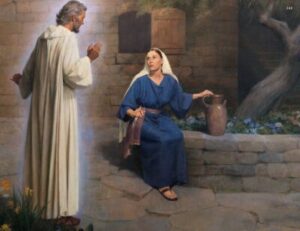 सगाई और औपचारिक विवाह के बीच में एक समय में, मरियम अकेली थी और दूत जिब्राइल उसके पास आया, वह उसके पास गया और कहा: अभिनंदन, आप को बहुत पसंद किया गया है! मरियम को कृपा प्राप्त करने के रूप में अनुग्रह देने की शक्ति के साथ नहीं वर्णित किया गया हैl उसे इस कार्य के लिए चुना नहीं गया क्योंकि उसके पास इस विशेषाधिकार के लिए जीवन की एक विशेष पवित्रता थी। जिब्राईल के शब्द मरियम के हिस्से पर कोई विशेष योग्यता का सुझाव नहीं देते हैं। परमेश्वर तुम्हारे साथ है (लूका १:२८)। उन शब्दों के साथ, मरियन ने अपनी प्रतिष्ठा और अपने सपनों को खो दिया। बहुत वास्तविक संभावना थी कि वह यहूदी समुदाय से अपने बाकी के जीवन के लिए बहिष्कृत की गई होगी। कम से कम शुरुआत में, उसने अपना पति होने के लिए पति-का-विश्वास खो दिया। और उसके माता-पिता का क्या? क्या उन्होंने उसके चमत्कारिक बिना यौन सम्बन्ध के गर्भधारण की उसकी विचित्र कहानी पर विश्वास किया होगा? यह असंभव है कि उसका परिवार इतनी अपमानजनक कहानी के लिए गिर गया। मरियम के उद्देश्यों को गले लगाने के मरियम के फैसले ने कठिनाइयों का हिमस्खलन उस पर आ पड़ा होगा और उसे लुभावनी विशेषाधिकार और अनजान दर्द के एक विचित्र मिश्रण में आकर्षित किया होगा। हमें याद दिलाया जाता है कि इस सब के बावजूद एदोनाय की इच्छा के लिए आत्मसमर्पण करने के लिए उत्सुक दिल से पहले जीवन का महत्व होता है।
सगाई और औपचारिक विवाह के बीच में एक समय में, मरियम अकेली थी और दूत जिब्राइल उसके पास आया, वह उसके पास गया और कहा: अभिनंदन, आप को बहुत पसंद किया गया है! मरियम को कृपा प्राप्त करने के रूप में अनुग्रह देने की शक्ति के साथ नहीं वर्णित किया गया हैl उसे इस कार्य के लिए चुना नहीं गया क्योंकि उसके पास इस विशेषाधिकार के लिए जीवन की एक विशेष पवित्रता थी। जिब्राईल के शब्द मरियम के हिस्से पर कोई विशेष योग्यता का सुझाव नहीं देते हैं। परमेश्वर तुम्हारे साथ है (लूका १:२८)। उन शब्दों के साथ, मरियन ने अपनी प्रतिष्ठा और अपने सपनों को खो दिया। बहुत वास्तविक संभावना थी कि वह यहूदी समुदाय से अपने बाकी के जीवन के लिए बहिष्कृत की गई होगी। कम से कम शुरुआत में, उसने अपना पति होने के लिए पति-का-विश्वास खो दिया। और उसके माता-पिता का क्या? क्या उन्होंने उसके चमत्कारिक बिना यौन सम्बन्ध के गर्भधारण की उसकी विचित्र कहानी पर विश्वास किया होगा? यह असंभव है कि उसका परिवार इतनी अपमानजनक कहानी के लिए गिर गया। मरियम के उद्देश्यों को गले लगाने के मरियम के फैसले ने कठिनाइयों का हिमस्खलन उस पर आ पड़ा होगा और उसे लुभावनी विशेषाधिकार और अनजान दर्द के एक विचित्र मिश्रण में आकर्षित किया होगा। हमें याद दिलाया जाता है कि इस सब के बावजूद एदोनाय की इच्छा के लिए आत्मसमर्पण करने के लिए उत्सुक दिल से पहले जीवन का महत्व होता है।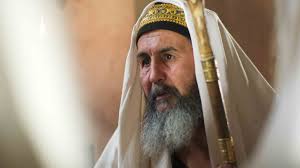 १ इतिहास २४ में, राजा दाऊद ने लेवी के वंश को चौबीस भागों में बांट दिया। प्रत्येक भाग साल में दो बार मंदिर अनुष्ठानों के दैनिक कार्यों की देखभाल करने के लिए दो सप्ताह की अवधि के बाद बदल जाएगा। पेसाच के प्रमुख तीर्थ के त्यौहारों के दौरान, पेंतिकोस्त, और सुकोट, पर सभी विभाग सेवा करते थेl एक महायाजक होता था, उसके नीचे बीस मुख्य पुजारी थे और उनके अधीन चौबीस पाठ्यक्रम के सदस्य होते थे, जो आम पुजारी होते थे। जकर्याह एक आम पुजारी था जो अबीहा के पुजारी पाठ्यक्रम से संबंधित था। आम पुजारियों के कर्तव्यों को बहुमत से चुना गया था। वहां बहुत सारे लेवी थे, हालांकि, वे आमतौर पर सेवा के लिए अपने पूरे जीवनकाल में केवल एक मौका मिलता था। फिर भी, जकर्याह मंदिर में हर साल पांच बार सेवा के पवित्र कार्यों में भाग लेने के लिए अपने घर से निकल आया था।
१ इतिहास २४ में, राजा दाऊद ने लेवी के वंश को चौबीस भागों में बांट दिया। प्रत्येक भाग साल में दो बार मंदिर अनुष्ठानों के दैनिक कार्यों की देखभाल करने के लिए दो सप्ताह की अवधि के बाद बदल जाएगा। पेसाच के प्रमुख तीर्थ के त्यौहारों के दौरान, पेंतिकोस्त, और सुकोट, पर सभी विभाग सेवा करते थेl एक महायाजक होता था, उसके नीचे बीस मुख्य पुजारी थे और उनके अधीन चौबीस पाठ्यक्रम के सदस्य होते थे, जो आम पुजारी होते थे। जकर्याह एक आम पुजारी था जो अबीहा के पुजारी पाठ्यक्रम से संबंधित था। आम पुजारियों के कर्तव्यों को बहुमत से चुना गया था। वहां बहुत सारे लेवी थे, हालांकि, वे आमतौर पर सेवा के लिए अपने पूरे जीवनकाल में केवल एक मौका मिलता था। फिर भी, जकर्याह मंदिर में हर साल पांच बार सेवा के पवित्र कार्यों में भाग लेने के लिए अपने घर से निकल आया था। जकर्याह के लिए परमेश्वर की घोषणा हेरोदेस महान यहूदिय के रजा के समय हुई थी, जिसकी मृत्यु ४ ईसा पूर्व में हो गई थी। इस्राएल के लोगों की राजनीतिक स्थिति अपमानजनक थी और उनकी आध्यात्मिक स्थिति में भी कमी आई थी। अपराध के राक्षस हेरोदेस ने उनका दमन किया, और पाखंडी यहूदी धर्म के तहत उनका विश्वास समारोहों और अनुष्ठानों की एक खाली प्रणाली बन गया था। परन्तु उस आध्यात्मिक सूखे के बीच में लेवी के गोत्र में से एक जकर्याह नाम का एक पुजारी था, और उसकी पत्नी इलीशिबा जो हारून के वंश की थी (लूका १: ५)। पुजारी के लिए पत्नियों के चयन में बड़ी देखभाल की गई थी, ताकि पारिवारिक रेखा को हर सम्मान में निर्दोष रखा जा सके। तो जकर्याह को दोगुना आशीर्वाद दिया गया क्योंकि रब्बियों (धार्मिक अगुवों) ने सिखाया कि पुजारी बनना एक सम्मान था, लेकिन एक पुजारी की बेटी से शादी करने के लिए एक डबल सम्मान था। इसलिए, योहन, वंशावली द्वारा एक पुजारी था। जकर्याह का अर्थ है कि परमेश्वर याद करते हैं, और इलीशिबा का अर्थ परमेश्वर की शपथ है। तो उन दोनों के नामों को साथ मिलाकर अर्थ है परमेश्वर को अपनी शपथ याद है।
जकर्याह के लिए परमेश्वर की घोषणा हेरोदेस महान यहूदिय के रजा के समय हुई थी, जिसकी मृत्यु ४ ईसा पूर्व में हो गई थी। इस्राएल के लोगों की राजनीतिक स्थिति अपमानजनक थी और उनकी आध्यात्मिक स्थिति में भी कमी आई थी। अपराध के राक्षस हेरोदेस ने उनका दमन किया, और पाखंडी यहूदी धर्म के तहत उनका विश्वास समारोहों और अनुष्ठानों की एक खाली प्रणाली बन गया था। परन्तु उस आध्यात्मिक सूखे के बीच में लेवी के गोत्र में से एक जकर्याह नाम का एक पुजारी था, और उसकी पत्नी इलीशिबा जो हारून के वंश की थी (लूका १: ५)। पुजारी के लिए पत्नियों के चयन में बड़ी देखभाल की गई थी, ताकि पारिवारिक रेखा को हर सम्मान में निर्दोष रखा जा सके। तो जकर्याह को दोगुना आशीर्वाद दिया गया क्योंकि रब्बियों (धार्मिक अगुवों) ने सिखाया कि पुजारी बनना एक सम्मान था, लेकिन एक पुजारी की बेटी से शादी करने के लिए एक डबल सम्मान था। इसलिए, योहन, वंशावली द्वारा एक पुजारी था। जकर्याह का अर्थ है कि परमेश्वर याद करते हैं, और इलीशिबा का अर्थ परमेश्वर की शपथ है। तो उन दोनों के नामों को साथ मिलाकर अर्थ है परमेश्वर को अपनी शपथ याद है।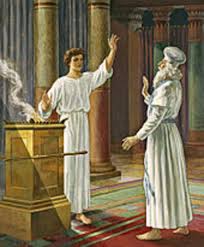 और जब धूप जलने का समय आता था, तब सभी उपासक बाहर इकट्ठे होकर प्रार्थना कर ते थे (लूका १:१०)। उस समय जकर्याह पूरे यहूदी राष्ट्र का केंद्रबिंदु था। तभी, बस अपने पुजारी जीवन के चरम पर, जैसे ही धूप का बादल उठना शुरू हुआ, एदोनाय के एक दूत ने उसे दर्शन दिया, वह वेदी के दाहिने तरफ खड़ा था। जब जकर्याह ने उसे देखा, तो वह चौंक गया और डर ने उसे जकड़ लिया, सचमुच उसके ऊपर बहुत भय छागया। लेकिन दूत का संदेश न्याय और मृत्यु में से कोई नहीं था, लेकिन आशीर्वाद और एक नया जीवन के आने के लिए था। दूत ने उससे कहा, ” जकर्याह, डर मत; आपकी प्रार्थना सुनी गई है। आपकी पत्नी इलीशिबा आपको एक बेटा देगी, और आप उसे योहनन नाम देंगे “(लूका १:११-१३)। यूहन्ना के लिए हिब्रू शब्द का मतलब है कृपा, नए अनुग्रह की ओर इशारा करते हुए (
और जब धूप जलने का समय आता था, तब सभी उपासक बाहर इकट्ठे होकर प्रार्थना कर ते थे (लूका १:१०)। उस समय जकर्याह पूरे यहूदी राष्ट्र का केंद्रबिंदु था। तभी, बस अपने पुजारी जीवन के चरम पर, जैसे ही धूप का बादल उठना शुरू हुआ, एदोनाय के एक दूत ने उसे दर्शन दिया, वह वेदी के दाहिने तरफ खड़ा था। जब जकर्याह ने उसे देखा, तो वह चौंक गया और डर ने उसे जकड़ लिया, सचमुच उसके ऊपर बहुत भय छागया। लेकिन दूत का संदेश न्याय और मृत्यु में से कोई नहीं था, लेकिन आशीर्वाद और एक नया जीवन के आने के लिए था। दूत ने उससे कहा, ” जकर्याह, डर मत; आपकी प्रार्थना सुनी गई है। आपकी पत्नी इलीशिबा आपको एक बेटा देगी, और आप उसे योहनन नाम देंगे “(लूका १:११-१३)। यूहन्ना के लिए हिब्रू शब्द का मतलब है कृपा, नए अनुग्रह की ओर इशारा करते हुए (
 El libro de Hebreos no enseña sobre dos tipos de creyentes mesiánicos, uno inmaduro y otro maduro. Por el contrario, el escritor, bajo la inspiración del Ruaj HaKodesh, describe las diferencias entre los incrédulos judíos y los creyentes judíos. El escritor había apenas comenzado su consideración del sacerdocio de Melquisedec cuando él se sintió obligado por el Santo Espíritu para hacer una pausa y dar dos avisos a los incrédulos judíos dentro de la comunidad mesiánica (5:11 a 6:8), advirtiendo de los graves peligros de rechazar la revelación y la gracia de Dios. Estas
El libro de Hebreos no enseña sobre dos tipos de creyentes mesiánicos, uno inmaduro y otro maduro. Por el contrario, el escritor, bajo la inspiración del Ruaj HaKodesh, describe las diferencias entre los incrédulos judíos y los creyentes judíos. El escritor había apenas comenzado su consideración del sacerdocio de Melquisedec cuando él se sintió obligado por el Santo Espíritu para hacer una pausa y dar dos avisos a los incrédulos judíos dentro de la comunidad mesiánica (5:11 a 6:8), advirtiendo de los graves peligros de rechazar la revelación y la gracia de Dios. Estas 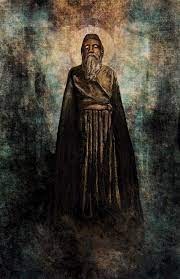 Melquisedec
Melquisedec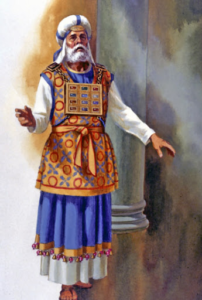 El Sumo Sacerdote debe ser humano:
El Sumo Sacerdote debe ser humano:






